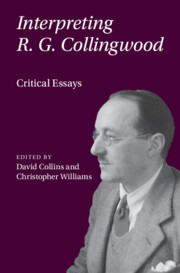Book contents
- Interpreting R. G. Collingwood
- Interpreting R. G. Collingwood
- Copyright page
- Contents
- Figures
- Contributors
- Acknowledgements
- Abbreviations
- Introduction
- Part I Situating Collingwood: Beyond Idealism
- Chapter 1 Collingwood and Logical Positivism
- Chapter 2 On Collingwood’s Criticism of Analytic Philosophy
- Chapter 3 Collingwood and the New Pragmatists on Socially Situated Knowledge
- Chapter 4 Collingwood and Wittgenstein on the Relation between Philosophy and Poetry
- Chapter 5 Collingwood and Phenomenology
- Chapter 6 Revisiting Gadamer’s Critique of Collingwood
- Part II Issues in Collingwood’s Philosophy
- Bibliography
- Index
Chapter 5 - Collingwood and Phenomenology
Intentionality, Expression, and Responsibility
from Part I - Situating Collingwood: Beyond Idealism
Published online by Cambridge University Press: 22 November 2024
- Interpreting R. G. Collingwood
- Interpreting R. G. Collingwood
- Copyright page
- Contents
- Figures
- Contributors
- Acknowledgements
- Abbreviations
- Introduction
- Part I Situating Collingwood: Beyond Idealism
- Chapter 1 Collingwood and Logical Positivism
- Chapter 2 On Collingwood’s Criticism of Analytic Philosophy
- Chapter 3 Collingwood and the New Pragmatists on Socially Situated Knowledge
- Chapter 4 Collingwood and Wittgenstein on the Relation between Philosophy and Poetry
- Chapter 5 Collingwood and Phenomenology
- Chapter 6 Revisiting Gadamer’s Critique of Collingwood
- Part II Issues in Collingwood’s Philosophy
- Bibliography
- Index
Summary
Despite R. G. Collingwood’s relation to British Idealism, a close reading of his subtle descriptions of imagination and expression reveals important points of contact with the phenomenological tradition. In the first section, I bring together Collingwood’s exploration of the role of imagination in art with Merleau-Ponty’s concepts of intentionality and expression. This provides insights into both thinkers’ attempts to describe lived experience and action, highlighting important aspects of their work overlooked by readers. In the second section, I explore how Collingwood and Merleau-Ponty both describe communication as an open and evolving movement of understanding that does not fall back upon a supposedly isolated consciousnesses, thereby eluding the threat of solipsism. In the third section, I outline the connection between Husserl’s identification of a “crisis” in the European sciences and Collingwood’s invocation against what he calls the “corruption of consciousness,” a particularly modern shirking of our responsibilities as expressive and active members of the community.
Keywords
- Type
- Chapter
- Information
- Interpreting R. G. CollingwoodCritical Essays, pp. 82 - 101Publisher: Cambridge University PressPrint publication year: 2024

